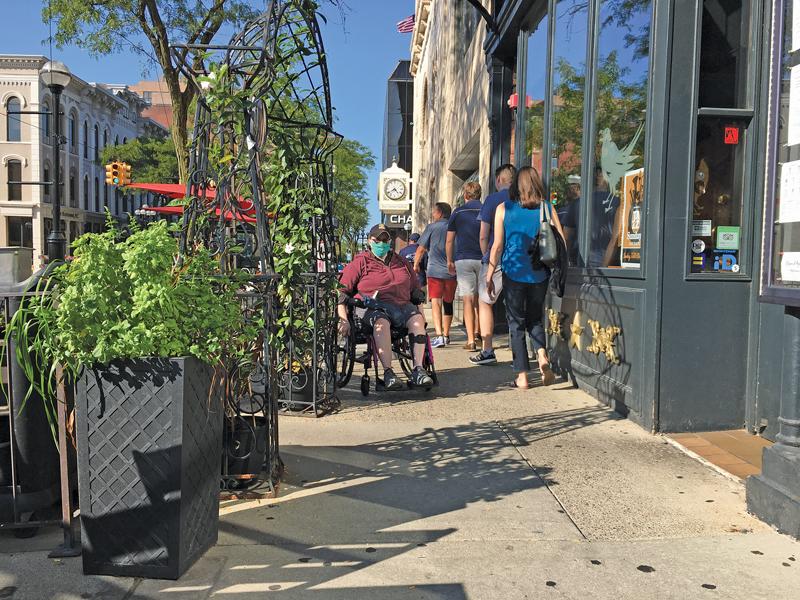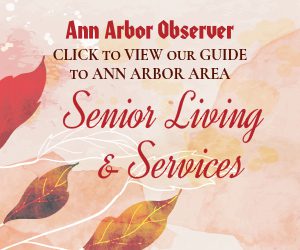Hunter, fifty-six, suffers from spinal stenosis and serious nerve problems, so she pushes herself through Ann Arbor’s sidewalks, parking lots, alleys, restaurant doorways, and business entrances in a wheelchair.
That has always been challenging, but she says that Covid-19 has made it a lot harder–and more dangerous.
“I completely understand why the city agreed to let restaurants put tables, chairs, heaters, and serving stations outdoors, so people could eat there during Covid,” Hunter says. “But someone has to pay attention to those of us who can’t easily maneuver around them all.”
On Labor Day weekend, a friend took her to the Miller Maple Plaza for a haircut. When they left around lunchtime, the diners at a nearby restaurant blocked the women’s path back to the car. Hunter’s friend grabbed the wheelchair handles and steered her out into the parking lot.
“When my daughter was little, I always warned her to walk in front of cars, never behind them–but going behind them was the only option we had that day,” Hunter says. And sure enough, just as the wheelchair was about to pass a parked car, its driver put her car into reverse and stepped on the gas. Higher vehicles on either side of her car blocked her view. She very narrowly missed the two women.
“She got out of the car and apologized profusely, and I told her it was OK, we weren’t hurt. But that wasn’t the point,” Hunter says. “People go through their lives without being aware of the special challenges those of us with handicaps face–particularly these days.”
“Covid has been really hard on everyone–but especially those of us with handicaps,” observes Alex Gossage, executive director of the Center for Independent Living. He cites two changes to downtown that have added to the stress of residents with mobility problems: “First, the outside seating on sidewalks and streets that narrow or complicate pathways; and second, the street closures that have eliminated accessible parking spaces, making it more challenging for people with handicaps to park and shop.” And people with vision problems have as much trouble maneuvering around tables and chairs and up and down curbs as those in wheelchairs.
Though it might seem easier to access outside tables from a wheelchair, Hunter says that’s not the case: she still must either transfer to the provided chair or ask to have it removed so she can roll up to the table. Then someone has to get either her wheelchair or the original chair out of the way.
And accessibility can change in a matter of minutes. Another time, Hunter arrived at a restaurant and easily rolled to a table by the window. By the time she left, the place was packed with seated diners, who had to stand and push in their chairs for her to get by. “I can’t remember a time when I’ve ever felt so uncomfortable and embarrassed,” she says.
The Covid complications add to the obstacles people with handicaps have always faced: inclement weather, potholes and broken pavement, construction equipment and scaffolding that eclipses sidewalks, and missing curb cuts–“although Ann Arbor has done a good job with them in the past few years,” Hunter says.
Small obstacles that walkers scarcely notice can stop a wheelchair in its tracks, like the raised threshold at one of her favorite restaurants. When she gets stuck, “someone will rush to help me, and the restaurant manager always apologizes profusely, but it’s embarrassing for me,” she says. “I’ve spoken to the manager several times about doing something about that metal lip, but nothing is ever done about it.”
Gossage says the pandemic further hindered people’s mobility when accessible, affordable public transportation was temporarily shut down, and then had shorter and more variable hours. But he commends the way the county health department handled vaccinations for shut-ins and people with handicaps: “In some cases, they brought the vaccines to people’s homes.”
“There are definite frustrations in our community as we all try to go back out into the world again,” Gossage says. “I haven’t heard of any injuries or fatalities from the changes the pandemic inspired in street closures or sidewalk dining, but whether situations are based on temporary changes Covid inspired or our daily lives, everyone always appreciates thoughtfulness and understanding.”


